strategyanalytics
Latest
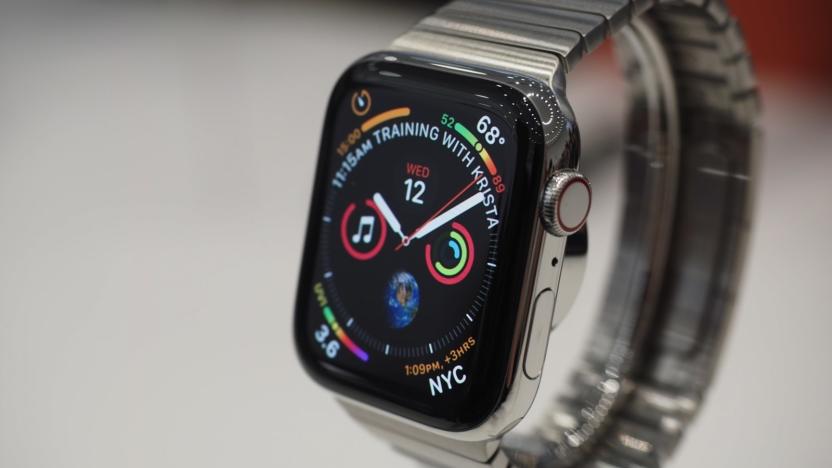
Smartwatch shipments grow 67 percent in Q3 thanks to Apple and Fitbit
The smartwatch market doesn't show any signs of slowing down, and it might have just hit a major milestone in the process. Strategy Analytics estimates that smartwatch shipments grew a whopping 67 percent year-over-year in the third quarter of 2018, with 10 million devices heading out the door. The frontrunner won't surprise you -- Apple is believed to have shipped 4.5 million watches (nearly a million more than last year) thanks to the debut of its overhauled Series 4. Fitbit proved to be the real upstart, through, jumping from zero to 1.5 million thanks mostly to the Versa.
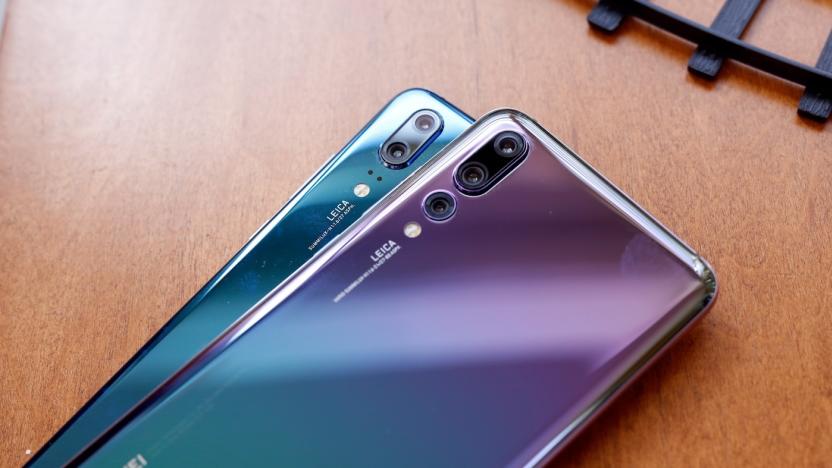
Huawei supplants Apple as the second largest smartphone seller
While Huawei was already a smartphone giant, analyst numbers released today show that in the last quarter it pumped out more smartphones than any company in the world other than Samsung. IDC and Strategy Analytics found that smartphone sales slowed overall, a trend that hit Samsung the hardest of the big companies with its numbers dropping off by more than 10 percent from last year. In its earnings report yesterday, Samsung said it's moved the Galaxy Note 9 launch up as a result of lackluster Galaxy S9 sales, and it's planning new devices based on foldable OLED technology. Meanwhile, for Huawei a healthy reception for the P20 Series (we called the Pro version "the best smartphone you'll never buy") and the popularity of its midrange Nova devices delivered shipments of 54.2 million units. That beat their projections for Apple by more than 10 million and snagged 15 percent of the worldwide market. Both analysts found that while Apple's smartphone shipments grew, they aren't growing as fast as Huawei and its fellow Chinese company Xiaomi. It could look to pick up the pace with the new iPhones it launches this fall, particularly if they have features coveted in international markets like support for dual SIM cards.
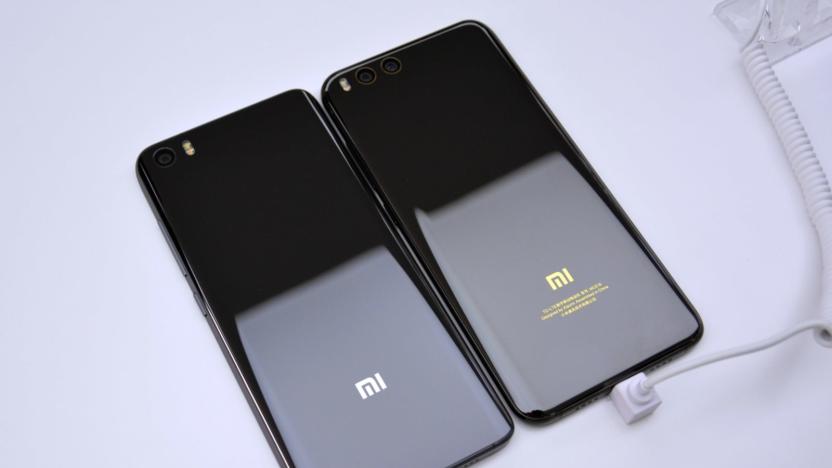
Xiaomi is one of the world's biggest phonemakers, again
Samsung shipped two percent more phones in the second quarter of 2017 compared to the same period last year, according to Strategy Analytics. By shipping 79.5 million out of 360 million units worldwide, it remains the top smartphone-maker in the world -- it has been for a while, so it's not the standout name in the market research company's list. It's Xiaomi, which reclaimed the fifth spot in the top phone manufacturers list for the first time in a year.
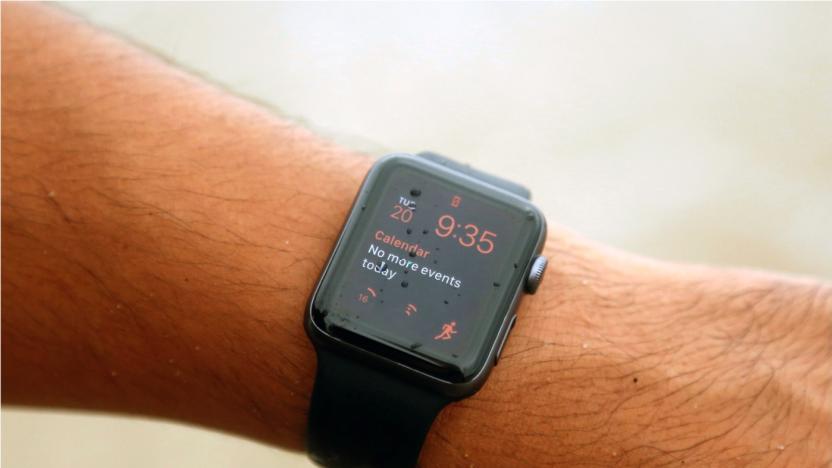
The Apple Watch outsold every other wearable last quarter
Apple might not be selling as many iPhones as it would like, but it sounds like its Watches have been doing quite well. According to Strategy Analytics, it shipped 3.5 million wearables in the first quarter of 2017, 59 percent higher than the 2.2 million devices it did in the same period last year. Cupertino captured 16 percent of the global marketshare and stole the wearables crown from Fitbit, which had a much less stellar quarter. Fitbit only shipped 2.9 million devices in Q1, 36 percent less than the 4.5 million units it moved in the first quarter of 2016. Even Xiaomi sold more devices, putting the beleaguered wearables-maker in third place.

iPad regains share in a shrinking mobile tablet market
Apple's share of the tablet market has been sliding for a while, but it's making a comeback... if not for the reasons the company might prefer. Strategy Analytics estimates that the iPad climbed from 19.1 percent of the market in the third quarter of 2015 to 19.9 percent a year later. However, that's mainly because the market as a whole shrank 10 percent. The analysts believe that many tablet manufacturers' shipments dropped year-to-year, and that Apple simply experienced a smaller decline than most. The one major exception is Amazon, whose $49 Fire tablet helped its shipments more than double.

Smartphone makers shipped a record 1.4 billion devices in 2015
Smartphone global shipments grew 12 percent and hit a record 1.4 billion devices in 2015, according to Strategy Analytics. That doesn't mean all's well in the industry, though -- not when it's no longer expanding as fast as it did in the past. In the fourth quarter of 2015, shipments grew merely six percent from the same period in 2015. The research company says that's the industry's slowest growth rate of all time, most likely because the people in major markets like China who are inclined to use smartphones already have one.

It's been a slow year for the smartphone industry
We all know that smartphone sales have slowed down recently, but it's apparently been especially sluggish this past year. According to Strategy Analytics' latest report, global shipments grew by 10 percent from Q3 2014 (323.4 million units) to Q3 2015 (354.2 million). However, 10 percent is tiny compared to previous quarters, making this the slowest growth rate within the past six years since the global recession in 2009. The research company attributes the industry's poor performance to the "increasing penetration maturity in major markets of the US, Europe and China." In other words, most people who want smartphones already have one, and not everyone can afford replacing theirs every year.

Shipments of 'white box' tablets overtake iPads
The hottest-selling tablets aren't likely to be iPads or Galaxy Tabs these days -- if anything, they're the cut-rate slabs you see in the back of the drug store. Strategy Analytics estimates that shipments of generic "white box" tablets (which typically run Android) overtook iPads in the first quarter of this year, claiming 28.4 percent of the market versus Apple's 24.3. The analysts largely chalk this up to consistently tepid iPad sales, but they also suggest that small, budget-minded tablet makers are having a field day. That's not totally surprising. Low-cost Android gear also dominates the smartphone market, and a lot of these tiny outfits operate in China, where price is more of a concern. You don't need a $500 slate just to watch video in bed, after all.
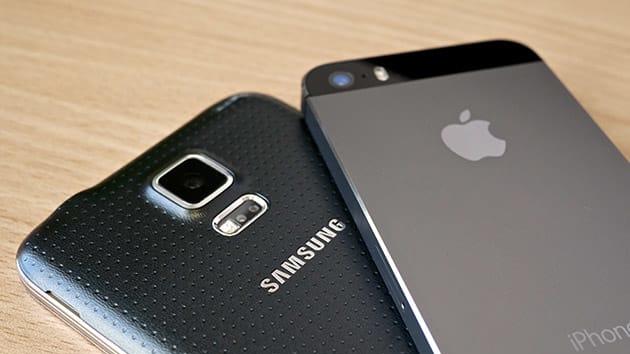
Apple's now shipping as many smartphones as Samsung
When people talk about Apple and Samsung, the lazy narrative is to say that Apple makes the most money, but Samsung makes the most devices. According to Strategy Analytics, however, that story may no longer actually be the case. In its latest look at the state of the industry, Apple and Samsung both shipped an estimated 74.5 million devices in the last three months of 2014, making them joint first in the shipments race. Of course, this was the first period where both the iPhone 6 and 6 Plus were made available, but even still, those are some hefty numbers.

Xiaomi may now be the third-biggest smartphone maker in world
Xiaomi, the smartphone of choice in China, just had a really good few months selling phones. According to Strategy Analytics, it reckon the new phone maker is now the third largest smartphone maker in the world, trailing only Samsung and Apple. Its shipments have tripled in the space of a year, now up to 18 million in Q3 2014, while its share of the smartphone has also more than doubled, shifting from 2.1 to 5.6 percent. Those sales also make it the 5th largest phone manufacturer (including cheaper feature phones). While Samsung (24.7 percent) and Apple (12.3 percent) still dominate, LG's recent good run, selling a record number of phones, has also moved it to fourth. Barring making it big in India, we're looking to see what Xiaomi's going to do next.

Android climbed to 79 percent of smartphone market share in 2013, but its growth has slowed
Android may have quickly reached the top of the smartphone world, but there are signs that this red-hot growth is cooling off... if only just. Strategy Analytics estimates that the platform claimed nearly 79 percent of smartphone market share in 2013. While that's both a record high and a big step up from almost 69 percent in 2012, it also represents Android's slowest annual growth rate since its birth. As the analysts note, Google is facing an increasingly saturated market; there are only so many more customers it can reach. Not that things were rosy for other mobile operating systems last year. Apple shipped more phones in 2013, but not enough to avoid a dip to 15.5 percent market share. Windows Phone grew to 3.6 percent share, although its one-point improvement over 2012 wasn't going to make Apple or Google nervous. And for smaller platforms, 2013 was downright ugly. BlackBerry, Symbian and others fell from a collective 9.1 percent in 2012 to just 2 percent. The smartphone market in 2014 is effectively a three-horse race, and it's doubtful that the rankings will change any time soon.

Smartphone sales may have topped 1 billion in 2013, depending on who you ask
You once had to look to the broader cellphone market to see more than a billion phones ship in one year. Well, times have changed... at least, if you ask the right analysts. IDC now estimates that smartphone shipments topped one billion for the first time in 2013. However, Strategy Analytics begs to differ -- it reckons that shipments fell just short, at 990 million. Whether or not the industry hit its symbolic milestone, the roughly 40 percent increase over 2012 data shows that the smartphone market had plenty of room to grow last year. Samsung led the pack with 31.3 percent of the the market, while Apple dipped to 15.3 percent as both Samsung and Chinese manufacturers (including Huawei and Lenovo) chipped away at its second-place position. As for what happened in the fourth quarter? Both analyst groups say that Samsung was once again the top vendor, although they note that the Korean firm's share was largely flat at 29 percent. Not that Apple fared any better, as its record-setting iPhone shipments weren't enough to prevent a slide to 18 percent share. Huawei, LG and Lenovo were the real victors -- each of them typically gained a point or more of share in the past year. IDC chalks some of this up to the rise of very low-cost smartphones, which are quickly taking over developing markets like China and India. Companies which focus on more expensive handsets, such as Apple and Samsung, have the most to lose in these areas.

Android tops 81 percent of smartphone market share in Q3
Now that we know what smartphone market share looked like in the third quarter when broken down by manufacturer, it's time to compare performance by platform. As you'd imagine, the world is still Android's oyster. Strategy Analytics estimates that the OS has crossed the symbolic 80 percent mark, reaching 81.3 percent of smartphone shipments by the end of September. Not that Google was the only company doing well -- Nokia's strong US sales helped Windows Phone grow to 4.1 percent of the market, or nearly double what it had a year ago. Whether or not these trends continue is another matter. Although Android likely isn't in danger given the launches of phones like the Galaxy Note 3, there are also new iPhones and Lumias on the scene; there may be one or two surprise upsets when the fourth quarter is over.

Huawei overtakes LG in smartphone market share during Q3
Need proof that China is a crucial smartphone market? Strategy Analytics is more than happy to oblige. It just posted third quarter global market share estimates showing that Huawei has overtaken LG since the Q2 report, claiming third place with 5.1 percent of sales. This isn't the first time that the Chinese phone maker has reached such lofty heights, but it comes even as LG produced stellar results; Huawei just happened to grow faster. Researchers attributed the rise to strong sales of its higher-end Ascend P6 and the mainstream G610, particularly in Huawei's home country. Otherwise, it's a familiar story. Samsung is still ruling the roost with 35.2 percent share, while Apple held on to the second-place spot at 13.4 percent. Huawei also isn't guaranteed to maintain its position when LG is likely to get a fourth quarter sales boost from the G2. However, it's evident that smartphone designers shouldn't get too comfy -- it doesn't take much to change the status quo.

Strategy Analytics: Android claimed nearly 80 percent of Q2 smartphone share
Multiple analyst groups recently gave us a look at second quarter smartphone market share by the manufacturer. Today, Strategy Analytics is breaking down that market share by platform -- and it's clear that Google is still on a roll. Android jumped 10 points year-over-year to reach almost 80 percent of the world smartphone market during the spring quarter, hitting a record high. Some of this rise came at the expense of Apple, which dipped three points, but most of the casualties were in the "others" category led by BlackBerry and Nokia's soon-to-vanish Symbian. Microsoft can claim a small victory, though. Windows Phone climbed slightly to 3.9 percent of the market in Q2, giving it a level of influence not seen in three years. While we're not necessarily looking at the new status quo for the smartphone industry, it's clear that the days of neck and neck competition are behind us.

Strategy Analytics: Android beats iOS in Q2 tablet shipments, Windows gains ground
All in all, global tablet shipments were up for Q2, according to new numbers released by analyst firm Strategy Analytics. Factoring in white-box units, the market saw 51.7 million tablets shipped in that time period -- that's up 43-percent compared to the same time last year. A lot of that good news can be chalked up to Android's success. The OS saw a healthy bump from 18.5- to 34.6 million units shipped, a number that has Google's mobile operating system holding 67-percent of the market. The news is a little less cheery on Apple's side of the OS wars, with shipments dipping from 17- to 14.6 million units, decreasing its marketshare to 28.3-percent, according to the firm. Microsoft, not surprisingly, saw a healthy increase in shipments from last year -- though it's still got a ways to go, calling around 4.5-percent of the market its own.

Apple hits three-year low in smartphone marketshare, shipment figures reveal
Fresh reports on the state of the cellphone market during Q2 2013 have blown through the barn door, and industry analysts are flaunting some fairly impressive figures. Smartphones have outsold their less-intelligent brethren for the second quarter in a row, and Strategy Analytics says shipments hit a record-breaking 237.9 million. According to IDC, Samsung managed to ship a total of 72.4 million smartphones during Q2 -- a 43.9% boost year-over-year -- with help of the Galaxy S 4 and price cuts to the GS3. To put that in perspective, that's more than double the 31.2 million iPhones Apple managed to ship, and Strategy Analytics claims this marks a three-year low in Cook and Co.'s marketshare. While LG and ZTE each occupy third and fifth place, respectively, Lenovo pushed Huawei out of the number four slot by sending out 11.3 million handsets. If you're craving for more stats, hit the break for a trio of press releases.

Strategy Analytics: Samsung topped China smartphone share in Q1
Many analysts believe that Samsung led the Chinese smartphone market throughout much of 2012, and there are already signs of a repeat coming in 2013. Strategy Analytics now estimates that the Galaxy maker sold 12.5 million smartphones in the country during the first quarter of this year, or enough to stay in front at 18.5 percent market share. Others didn't come close, although there was a fierce battle for the runner up spot. Huawei (8.1 million) barely pushed past Lenovo (7.9 million) to become number two in China, while Coolpad (7.1 million), ZTE (6.4 million) and Apple (6.1 million) were locked in their own fight for fourth place. While it's true that market share isn't the only yardstick for smartphone success, having the most popular devices in the world's most populous country undoubtedly helps with bragging rights.

Samsung estimated to make 95 percent of Android device profits
Yes, we all know that Android has the prevailing device market share right now, but which companies in that group are actually making money? According to Strategy Analytics' estimates for Q1, it's Samsung... and virtually no one else. With $5.1 billion of Samsung's $7.9 billion operating profit last quarter believed to have come from Android, the Korean firm reportedly accounted for 94.7 percent of Android's hardware profit engine. The only other company that made enough money to stand out was LG, whose $119 million in mobile profits got it to a much smaller 2.5 percent. HTC, Sony, ZTE and the rest were lumped into the ignominious "other" category, at 2.7 percent. The figures don't mean that all other Android manufacturers are floundering, but they do suggest that Samsung is in a much better position to survive any market turbulence.

Strategy Analytics: Microsoft's share of tablet market quadrupled after Windows 8
Say what you like about Windows 8, but before it arrived Microsoft's presence in the tablet sphere was as small as it was stagnant. By the reckoning of number-crunchers at Strategy Analytics, just 400,000 Windows-running slates were shipped globally in Q3 of last year -- a figure that was largely unchanged from the year before and which represented just 1.6 percent of the global tablet market. Six months later, now that the Windows-powered Acers, Lenovos and Surfaces of this world have had a chance to get their game on, Microsoft's share has quadrupled to 7.5 percent, with a total of 3 million Windows 8 and RT tablets shipped in Q1 2013. That's still pretty niche, but 3 million units would have equated to a bigger share were it not for the fact that the overall tablet market also grew over this period, from 25 million to 41 million units -- and at least Microsoft can now claim to be a part of that boom. Look past the break for the numerical breakdown.







